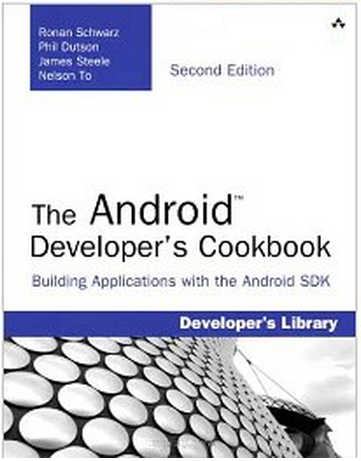| All About Android Books |
| Thursday, 11 September 2014 | |||||
Page 2 of 4
Advanced Level AndroidI Programmer's 5-star book for those who already understand how Android works, or who has who has created an app for another phone platform is Android in Action.
Saying that as well as being able to program in Java "you also need a fairly mature attitude towards programming to be a candidate reader", Harry Fairhead points out that when looking at creating a UI it does so from "an architectural point of view" and that in looking at the API "the level is usually deeper than most books on the same topic." At the "very advanced level" Harry Fairhead describes Advanced Android 4 Games as An indispensable book if you want to work on games like Doom and Quake.
His review warns: It really does get advanced and explains how to use the native code, i.e. C and Java, to create 3D programs. If you aren't interested in using native code together with OpenGL then this is not the "advanced" you are looking for. Harry awards this book a 4 and explains his mixed feelings by saying: This isn't a very good book in the sense that it doesn't do a good job of explaining the many difficult techniques it makes use of. While there are lots of really helpful and useful asides, comments and boxouts the book mainly tells you what you want to know by presenting long code examples. However this doesn't mean that this is a book you can ignore.There are very few books available at this level and if you want to know about using native code and the 3D engines under Android you probably need to get a copy.
At the intermediate level comes Android in Practice. Ian Elliot starts his review by saying: This really isn't a "Hello World" book. It starts out with an in-depth look at the Android system and how it differs from standard Java. He notes: A novelty of the book is that there are QR codes that you can use to download the examples printed where relevant. I'm not sure how useful this really is, but there are no downsides to it - just ignore it if you don't want to get your Android phone out to make use of it.
After an in-depth overview of the Android system that is largely theoretical Part 2 of the book, called Real World Recipes, is a collection of how to do standard things with chapters on the UI, services, threads, local storage, sharing data, web services, location, multimedia, 2D and 3D drawing. Part 3 is about advanced or uncommon techniques. Giving it a rating of 4.5 Ian concludes "this is an easy book to recommend" to programmers who have already produced at least a simple "hello world" Android program and become familiar with its development tools.
Cookbook-styleDevelopers in all programming languages sometimes like to "read" ready-made examples that show how to tackle different situations. As Mike James put it at the start of his review of The Android Developer's Cookbook: A cookbook for Android development seems like a very good idea given how complex it can seem at first.
This title is at intermediate level and assumes that you know how to program in Java and are already familiar with Androids development tools including Eclipse. Awarding it a rating of 4, Mike says: Overall this isn't really a cookbook, more a standard introduction to Android split up into bite sized chunks. If you like this sort of approach this is a good example of the genre. The big problem is that presenting recipes has a tendency to squeeze out the logical flow of explaining how things work. Later the book focuses on more advanced aspects of Android, or should that be topics you might or might not get to after mastering the fundamentals. None of the recipes takes you far off the beaten track and if you read the documentation and seek out some online examples you will probably do just as well - but a book is convenient and you can keep it for when you really need to know how to start working with NFC.
In his review of Android Recipes, also at intermediate level, Harry Fairhead points out: Many recipe and cookbook style book are actually tutorials broken down in to small sections. The clue to this book's nature is its subtitle - A Problem-Solution Approach. It does attempt to introduce Android programming in some sort of logical order but by posing questions and answering them mostly in code.
Giving it a rating of 4, he concludes: This is a big book and if you have it on your book shelf there are undoubtedly going to be recipes that you turn to sooner or later and they will be helpful to you, but more so if you prefer code over explanation. This is not a must-have book, but if your budget stretches to it then having it on your shelf is a good idea. Harry reviewed the 2nd Edition but the 3rd edition, with over a 100 recipes, is the latest available. <ASIN:1617290505> <ASIN:0321897536> <ASIN:1430263229> <ASIN:0321897536> <ASIN:1935182927>
|
|||||
| Last Updated ( Saturday, 18 October 2014 ) |




